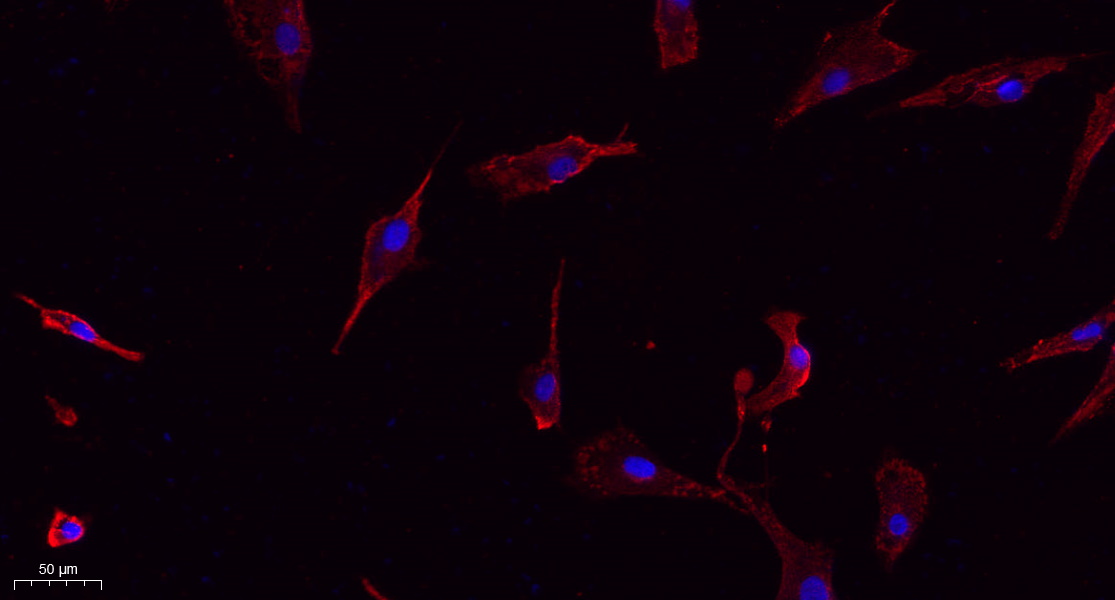Total Connexin 43 Cell-Based Colorimetric ELISA Kit
- Catalog No.:KA3085C
- Applications:ELISA
- Reactivity:Human;Mouse;Rat
- Gene Name:
- GJA1
- Human Gene Id:
- 2697
- Human Swiss Prot No:
- P17302
- Mouse Swiss Prot No:
- P23242
- Rat Swiss Prot No:
- P08050
- Storage Stability:
- 2-8°C/6 months
- Other Name:
- Gap junction alpha-1 protein (Connexin-43) (Cx43) (Gap junction 43 kDa heart protein)
- Detection Method:
- Colorimetric
- Background:
- caution:PubMed:11741837 reported 2 mutations (Phe-11 and Ala-24) linked to non-syndromic autosomal recessive deafness (DFNBG). These mutations have subsequently been shown (PubMed:12457340) to involve the pseudogene of connexin-43 located on chromosome 5.,caution:PubMed:7715640 reported a mutation Pro-364 linked to congenital heart diseases. This was later shown (PubMed:8873667) to be an artifact.,disease:Defects in GJA1 are a cause of hypoplastic left heart syndrome (HLHS) [MIM:241550]. HLHS refers to the abnormal development of the left-sided cardiac structures, resulting in obstruction to blood flow from the left ventricular outflow tract. In addition, the syndrome includes underdevelopment of the left ventricle, aorta, and aortic arch, as well as mitral atresia or stenosis.,disease:Defects in GJA1 are the cause of autosomal dominant oculodentodigital dysplasia (ODDD) [MIM:164200]; also known as oculodentoosseous dysplasia. ODDD is a highly penetrant syndrome presenting with craniofacial (ocular, nasal, dental) and limb dysmorphisms, spastic paraplegia, and neurodegeneration. Craniofacial anomalies tipically include a thin nose with hypoplastic alae nasi, small anteverted nares, prominent columnella, and microcephaly. Brittle nails and hair abnormalities of hypotrichosis and slow growth are present. Ocular defects include microphthalmia, microcornea, cataracts, glaucoma, and optic atrophy. Syndactyly type III and conductive deafness can occur in some cases. Cardiac abnormalities are observed in rare instances.,disease:Defects in GJA1 may be the cause of syndactyly type III (SDTY3) [MIM:186100]. Syndactyly is an autosomal dominant trait and is the most common congenital anomaly of the hand or foot. It is marked by persistence of the webbing between adjacent digits, so they are more or less completely attached. In this type there is usually complete and bilateral syndactyly between the fourth and fifth fingers. Usually it is soft tissue syndactyly but occasionally the distal phalanges are fused. The fifth finger is short with absent or rudimentary middle phalanx. The feet are not affected.,function:One gap junction consists of a cluster of closely packed pairs of transmembrane channels, the connexons, through which materials of low MW diffuse from one cell to a neighboring cell.,function:One gap junction consists of a cluster of closely packed pairs of transmembrane channels, the connexons, through which materials of low MW diffuse from one cell to a neighboring cell. May play a critical role in the physiology of hearing by participating in the recycling of potassium to the cochlear endolymph.,similarity:Belongs to the connexin family.,similarity:Belongs to the connexin family. Alpha-type (group II) subfamily.,subunit:A connexon is composed of a hexamer of connexins.,subunit:A connexon is composed of a hexamer of connexins. Interacts with SGSM3. Interacts with KIAA1432/CIP150.,tissue specificity:Expressed in the heart and fetal cochlea.,
- Function:
- cell morphogenesis, muscle system process, protein complex assembly, nucleotide transport, apoptosis, muscle contraction, cell-cell junction assembly, cell-cell signaling, heart development, cell death, negative regulation of cell proliferation, response to pH, response to abiotic stimulus, regulation of catabolic process, positive regulation of catabolic process, positive regulation of signal transduction, vascular transport, positive regulation of macromolecule metabolic process, regulation of protein kinase cascade, positive regulation of cell communication, positive regulation of protein kinase cascade, regulation of metal ion transport, programmed cell death, purine nucleotide transport, ATP transport, purine ribonucleotide transport, nucleobase, nucleoside, nucleotide and nucleic acid transport, gap junction assembly, death, cell projection organization, neuron differentiation, neu
- Subcellular Location:
- Cell membrane ; Multi-pass membrane protein . Cell junction, gap junction . Endoplasmic reticulum . Localizes at the intercalated disk (ICD) in cardiomyocytes and the proper localization at ICD is dependent on TMEM65. .
- Expression:
- Expressed in the heart and fetal cochlea.
- June 19-2018
- WESTERN IMMUNOBLOTTING PROTOCOL
- June 19-2018
- IMMUNOHISTOCHEMISTRY-PARAFFIN PROTOCOL
- June 19-2018
- IMMUNOFLUORESCENCE PROTOCOL
- September 08-2020
- FLOW-CYTOMEYRT-PROTOCOL
- May 20-2022
- Cell-Based ELISA│解您多样本WB检测之困扰
- July 13-2018
- CELL-BASED-ELISA-PROTOCOL-FOR-ACETYL-PROTEIN
- July 13-2018
- CELL-BASED-ELISA-PROTOCOL-FOR-PHOSPHO-PROTEIN
- July 13-2018
- Antibody-FAQs

.jpg)

